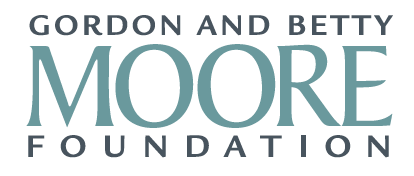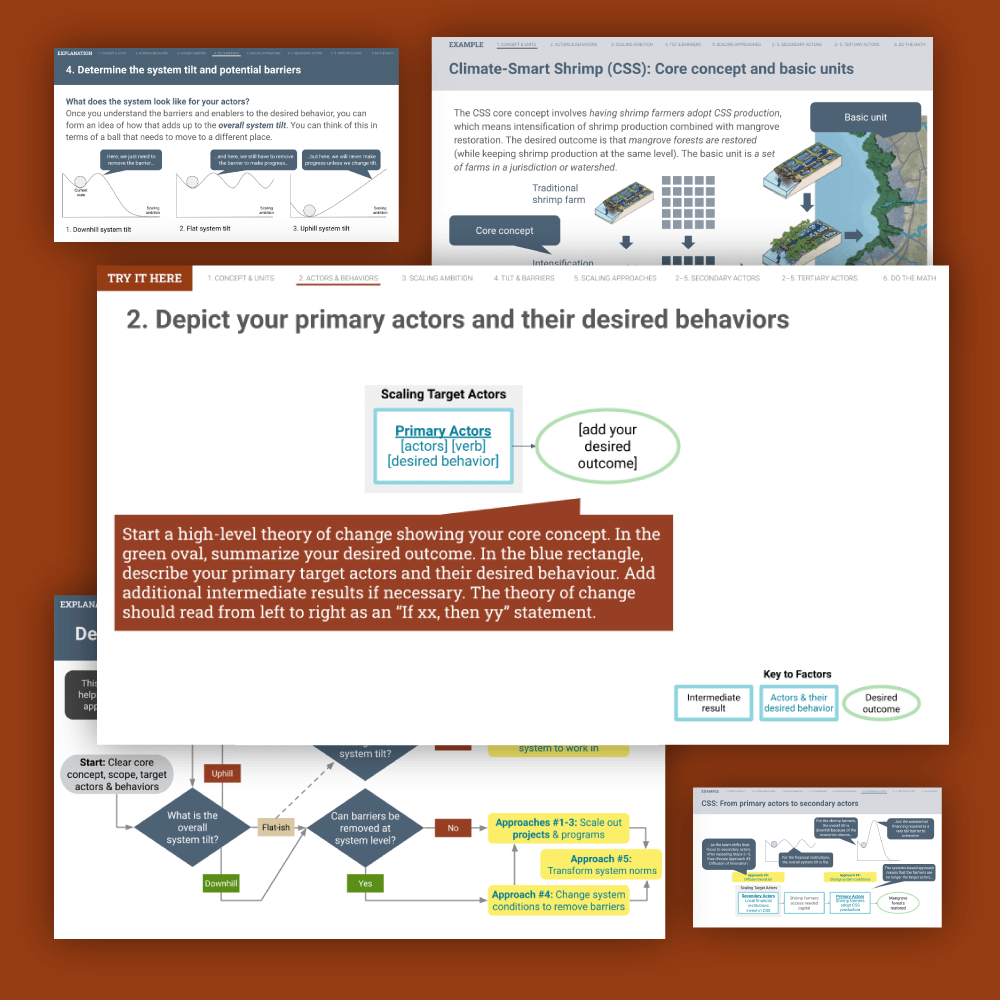Our work » Taking conservation to scale » Background
Taking conservation to scale
Background: The learning network
Achieving impact at scale is often an elusive goal of many civil society interventions. In environmental conservation, the magnitude of the issues that we collectively are facing – global loss of biodiversity, land-use change, invasive species, and climate change – means that we cannot simply focus on individual projects. Instead, we need to take action more effectively across the much larger range of program scales needed to address global issues.
Foundation of Success (FOS) has been working for over two years with the Gordon & Betty Moore Foundation (Moore Foundation) and the Walton Family Foundation in partnership with six real-world conservation programs to develop and test a framework for how to achieve impact at scale more systematically. This framework has combined five scaling approaches with both behavior change and networking theory.
The learning network
Partner programs
Climate Smart Shrimp Aquaculture
Scaling the adoption of Climate Smart shrimp production to shrimp aquaculture globally
Partners:
Location: Indonesia, Philippines, Ecuador
Fish Forever
Scaling networks of managed access and reserve areas enabling communities to sustainably manage coastal fisheries resources
Partners:
- Rare
- Local Partners
Location: Indonesia / Philippines, Palau / FSM, Mozambique, Honduras / Guatemala, Brazil
Partnership Reducing the Illegal Killing of Birds in the Mediterranean
Scaling integrated strategies for reducing killing of birds in countries in the Mediterranean region
Partners:
Location: Croatia, Cyprus, Montenegro, Greece, Mediterranean region
Network for Scaling Adaptive Management within Protected Area Systems
Scaling adaptive outcomes-based management of protected areas and networks across Latin America and beyond
Partners:
- Wildlife Conservation Society Peru
- RedParques (Network of Government Protected Area Agencies in Latin America)
- FOS LAC
Location: South America, Central America, Global
Scaling of Indigenous-led conservation using the CS
Scaling the use of the Conservation Standards / Healthy Country Planning to enable IPLC-led conservation efforts
Partners:
- CCNet Community of Practice CS Projects on Indigenous Lands and Waters
- administration of funds through Conservation Management
Location: Australia, Canada, Global
US Regenerative Row Crop Systems
Scaling the adoption of sustainable farming practices across the Upper Mississippi River Basin
Partners:
Location: USA
The learning network
Core team

Foundations of Success (FOS)
A non-profit organization that specializes in working with members of the conservation community to do strategic planning, adaptive management, monitoring and evaluation, and learning. As the coordinating member of the Conservation Measures Partnership, FOS has helped to develop both the Open Standards for the Practice of Conservation (aka Conservation Standards) and Miradi Software. FOS has also led the development of the Conservation Actions and Measures Library (CAML).
FOS serves as the overall coordinator of this work. FOS staff also plays a major role in the development of the draft framework and in providing training and coaching to the pilots where needed.

Gordon and Betty Moore Foundation
A private foundation driven by the vision of the founders, they enable lasting, meaningful change through sustained, scientifically sound philanthropy. Setting their sights high, the Foundation invests for the long-term in scientifically sound strategies that produce measurable results and lasting benefits. The Moore Foundation seeks to achieve through philanthropy what Gordon Moore accomplished for the world of computing: to create an ever more powerful engine of progress in society.
This project was undertaken in close collaboration with staff from the Adaptive Management and Evaluation program as well as other programs within the Moore Foundation.
The Walton Family Foundation
The Walton Family Foundation is a family-led foundation that tackles tough social and environmental problems with urgency and a long-term approach to create access to opportunity for people and communities. The Foundation works in three areas: improving K-12 education, protecting rivers and oceans and the communities they support, and investing in their home region of Northwest Arkansas and the Arkansas-Mississippi Delta. Their vision is to live in a world where people can accomplish anything when they have opportunity and encouragement.
This project was undertaken in close collaboration with staff within the Walton Family Foundation.

Network Dynamics Group, University of Pennsylvania
Damon Centola is a professor in the Annenberg School for Communication, the Department of Sociology, and the School of Engineering and Applied Sciences at the University of Pennsylvania, where he is Director of the Network Dynamics Group. His research, described in his recent book Change: How to Make Big Things Happen, focuses on social networks and behavior change. His work identifies the social causes of disease outbreaks; the origins of political conflict and ideological polarization; and the dynamics of tipping points in social norms.
Damon was a part of the Network Coordination Team managing this work and in particular, contributed his expertise to Strategy B which involves using behavior change and networking principles to develop plan for promoting adoption of this scaling framework – in effect, a meta-level application of our scaling framework.
Will your idea scale?
The FOS Scaling Challenge
An example of the tools we've developed to help you achieve impact at scale is the FOS Scaling Challenge – a step-by-step method that you can use to road-test your scaling idea. It helps you sketch out your scaling strategy by mapping out how the system works, defining the ultimate change you want to see, clarifying how you can get there, and checking the feasibility of the strategy.
Get support
Take your idea to scale
Do you want coaching or support in applying our scaling framework to your own context? Contact us to arrange anything from a brief consult to a fully facilitated workshop to walk you through the process of scaling your project, program, or idea.




